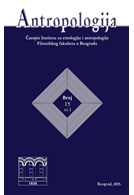ABOLICIJA RODA: NOVI SUBJEKTI KLASNE BORBE
Abolishing gender: new subjects of class struggle?
Author(s): Matej NikolacSubject(s): Gender Studies, Political Philosophy, Sociology of Culture, Sociology of Politics
Published by: Институт за етнологију и антропологију
Keywords: feminism; trans-feminism; essentialism; crypto-essentialism; radical democracy; queer theory; abolishing gender
Summary/Abstract: The aim of this paper is to present understandings of gender in particular feminist discourses which I find problematic for the future of feminist theory; but which permeate the spheres of academic, political, and activist feminism. The discourses of contemporary feminism, imbued with essentialist thought, are in political and theoretical conflict with the booming wave of trans-feminism. In the first part of the paper, I will focus on the hetero-normative imperative through which radical feminist discourse derives the definition of a category of „woman“ and try to show in what ways such an understanding of gender produces and maintains exclusivity across the whole spectrum of sexual and gender identities. The work continues, setting the stage for the confrontation of conflicting theories of radical and trans-feminism in the space opened up by LGBT studies – a neutral space from which we can critically see the gender imperatives produced within an essentialist stream of feminist thought. In order to bring the abolitionist impulse, as a potential solution to the gender problem within radical leftist thought, I will present a potential theoretical solution which culminates with the idea of abolishing gender. Accordingly, the paper will take into account the fields of power on which the problem of gender and gender relations arises: the field of naturalized sexuality, the sphere of traditional family models, and the materialistic discourse that assumes the „natural“ body and gender as the basis of reproductive exploitation. I am convinced that the work as a whole will provide a unique perspective on the possible trajectory of the development of gender theory and further feminist discourse that is subverted by socialist and radical-democratic worldviews.
Journal: Antropologija
- Issue Year: 20/2020
- Issue No: 2
- Page Range: 279-295
- Page Count: 17
- Language: Croatian

